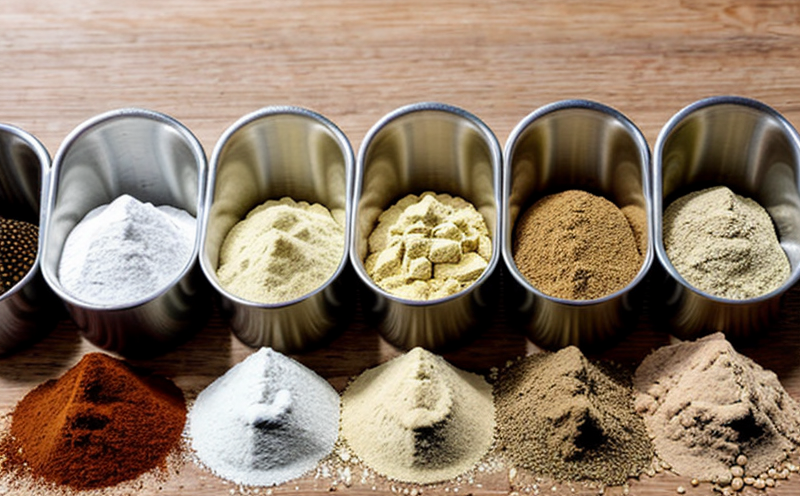ISO 21573 Vitamin E Analysis in Dairy Feed
The ISO 21573 standard provides a robust framework for analyzing vitamin E content in dairy feed, ensuring that the nutritional integrity and quality of the product are maintained. Vitamin E is a critical antioxidant essential for the health and productivity of dairy cattle, playing a key role in protecting cells from oxidative stress. Ensuring accurate and consistent measurement of vitamin E levels is paramount for maintaining animal health and optimizing milk production.
Our service utilizes advanced analytical techniques to perform precise quantification of alpha-tocopherol, the most biologically active form of vitamin E, as specified by ISO 21573. The standard outlines a method using high-performance liquid chromatography (HPLC) with photodiode array detection for this purpose. This approach ensures that we achieve accurate and reproducible results.
The process begins with meticulous sample preparation, which involves thorough extraction of vitamin E from the dairy feed matrix. Extraction efficiency is critical to obtaining reliable analytical data. Once extracted, the sample undergoes purification steps tailored to isolate alpha-tocopherol specifically for analysis. This step ensures that only the desired component is analyzed, minimizing interferences and ensuring precision.
The HPLC system used in our laboratory is equipped with a gradient solvent delivery system, which allows for optimal separation of components based on their polarity. The column typically used contains an octadecylsilane (ODS) stationary phase suitable for the separation of lipophilic compounds like vitamin E. Detection using photodiode array ensures that all peaks are accurately identified and quantified.
Once the analysis is complete, our team generates detailed reports that include a comprehensive breakdown of findings along with recommendations based on the results. Compliance with ISO 21573 ensures not only accuracy but also consistency in measuring vitamin E levels across different batches or locations.
This service supports dairy producers and feed manufacturers by ensuring their products meet stringent nutritional requirements, thereby contributing to better animal health and performance. By adhering strictly to ISO standards, we provide reliable data that can be used for quality control purposes as well as regulatory compliance.
Understanding the importance of vitamin E in dairy feeds is crucial for maintaining high levels of milk production and overall animal welfare. Our service not only helps meet these needs but also aids in optimizing feed formulations to maximize benefits while minimizing risks associated with potential deficiencies or excesses.
Eurolab Advantages
At Eurolab, we pride ourselves on offering unparalleled expertise and advanced technology tailored specifically for your unique testing requirements. Our commitment to precision and reliability has made us a leader in food & feed analysis services across various sectors including dairy, poultry, livestock, pet food, etc.
- State-of-the-Art Facilities: Equipped with cutting-edge analytical equipment such as HPLC systems compliant with ISO 21573 standards.
- Experienced Technicians: Trained professionals who stay updated on the latest trends and best practices in the field of food & feed analysis.
- Compliance Assurance: Our processes are designed to meet international standards, ensuring accurate and consistent results.
- Customer-Centric Approach: Tailored solutions that address specific needs while providing exceptional customer service.
We strive to deliver services that exceed expectations by combining technical excellence with a deep understanding of industry-specific challenges. With us, you can be confident in the quality and accuracy of our results, knowing they are backed by years of experience and cutting-edge technology.
International Acceptance and Recognition
The ISO 21573 standard has gained widespread recognition within the global food & feed industry. It is widely accepted in countries around the world as a benchmark for vitamin E analysis, particularly in dairy products. This international acceptance underscores its importance in ensuring consistent quality across different regions.
Many leading organizations and governments have adopted this standard to ensure that their regulations align with best practices. For instance, several regulatory bodies in Europe have incorporated ISO 21573 into their guidelines for monitoring vitamin E content in dairy feeds. Similarly, other regions like North America also recognize the value of adhering to these standards.
By participating in this standardized process, businesses can ensure that they are meeting not only local but also international requirements. This consistency is vital when operating across multiple markets or sourcing raw materials globally. Adherence to ISO 21573 demonstrates a commitment to excellence and sets you apart as a reliable partner for dairy operations worldwide.
The widespread adoption of this standard reflects its role in promoting transparency, trustworthiness, and fair competition within the industry. It helps build confidence among consumers who are increasingly concerned about the safety and quality of their food products. In summary, compliance with ISO 21573 aligns your business practices with global standards, enhancing both reputation and operational efficiency.
Environmental and Sustainability Contributions
The analysis of vitamin E in dairy feed through ISO 21573 contributes positively to environmental sustainability by ensuring the optimal use of resources. Accurate measurement helps prevent over- or under-supplementation, which can lead to waste and inefficiencies.
- Resource Optimization: Correct dosages reduce unnecessary usage of vitamin E supplements, conserving natural resources.
- Emissions Reduction: Efficient feed formulations contribute to lower methane emissions from livestock, promoting cleaner air.
- Biodiversity Preservation: Improved animal health leads to better productivity, reducing the need for additional land use or inputs.
Incorporating ISO 21573 into dairy operations enhances sustainability efforts by integrating scientific rigor with environmental responsibility. This approach supports broader goals of sustainable agriculture and food production systems globally.





